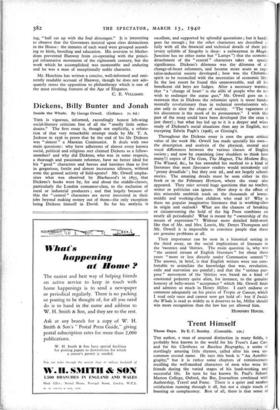Dickens, Billy Bunter and Jonah
Inside the Whale. By George Orwell. (Gollancz. 75. 6d.) Tins is vigorous, informed, exceedingly honest left-wing social-literary criticism free of all the " smelly little ortho- doxies." The first essay is, though not explicitly, a refuta- tion of that very remarkable attempt made by Mr. T. A. Jackson in 1936 to prove that by the end of his life Dickens was " almost " a Marxian Communist. It deals with two main questions: why have adherents of almost every known social, political and religious sect claimed Dickens as a fellow- member? and why did Dickens, who was in some respects, a thorough and passionate reformer, have no better ideal for his " good " characters and heroes and heroines than to live in gregarious, fertile and almost incestuous idleness, without even the genteel activity of field-sports? Mr. Orwell empha- sises what was observed by Blackwood's in 1855, that Dickens's books were by, for and about the middle-classes, particularly the London consumer-class, to the exclusion of rural or industrial producers ; and that largely because of this the " central " characters are never interested in their jobs beyond making money out of them—the only exception being Dickens himself in David. So far his analysis is excellent, and supported by splendid quotations ; but it hard goes far enough ; for the other characters are described fully with all the financial and technical details of their joi (every syllable of .Snagsby is shop : a railwayman in Muglr. 7unction has no other name but " Lamps ") that the economic detachment of the " central " characters takes on special significance. Dickens's dilemma was the dilemma of all change-of-heart reformers, and became more acute as capi- talist-industrial society developed ; how was the Christmas spirit to be reconciled with the necessities of economic life? In the last resort he found this unanswerable, and all his beneficent old boys are fudges. After a necessary warning that " a ' change of heart ' is the alibi of people who do not wish to endanger the status quo," Mr. Orwell goes on to maintain that in Dickens the reformist spirit is more funda- mentally revolutionary than in technical revolutionists who aim only to alter the shape of society. " The vagueness of his discontent is the mark of its permanence." I wish this part of the essay could have been developed (for the crux is just there) ; but what has led up to it is a deeper and wiser study of Dickens's social situations than any in English, not excepting Edwin Pugh's (1908), or Gissing's.
Throughout the Dickens essay is seen the great critical value of the work Mr. Orwell has made specially his own— the description and analysis of the physical, mental and vocal differences between the various classes of English society ; and now by examining (one shudders to think how many!) copies of The Gem, The Magnet, The Modern Boy, The Wizard, &c., he has extended his method to a kind of literature that most Spectator readers would mistakenly call ' penny dreadfuls ' ; but they cost 2d., and are largely school- stories. The amazing details must be seen either in this book or in the February Horizon, where the essay also appeared. They raise several huge questions that no teacher, writer or politician can ignore. How deep is the effect of this miserable snobbish trash on the thousands of lower- middle and working-class children who read it? Why is there no popular imaginative literature that is working-class in origin and outlook? What are the chances of breaking or circumventing the hold of the big Press combines on nearly all periodicals? What is meant by " ownership of the means of expression "? Without more detailed field-work like that of Mr. and Mrs. Leavis, Mr. Denys Thompson and Mr. Orwell it is impossible to convince people that these are genuine problems at all.
Their importance can be seen in a historical setting in the third essay, on the social implications of literaure in the 'twenties and 'thirties. The main question is, why was " the central stream of English literature " for about three years "more or less directly under Communist control "? The answer, in brief,' is that English writers were too com- fortable to assimilate the knowledge that war, revolution, exile and starvation are painful ; and that the " serious pur- pose" movement of the 'thirties was based on a kind of emotional pedantry quite alien, for instance, to the genuine honesty of belly-warm " acceptance " which Mr. Orwell finds and admires so much in Henry Miller. I can't endorse or comment adequately on his praise of Tropic of Cancer, which I read only once and cannot now get hold of : but if Inside the Whale is read as widely as it deserves to be, Miller should win more recognition than the law has yet allowed him.
HUMPHRY HOUSE.






















































 Previous page
Previous page